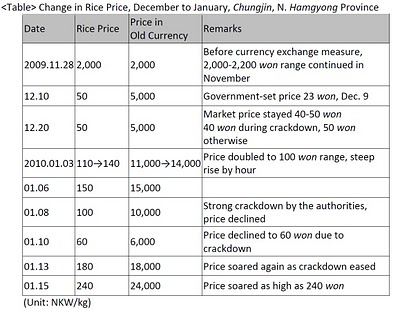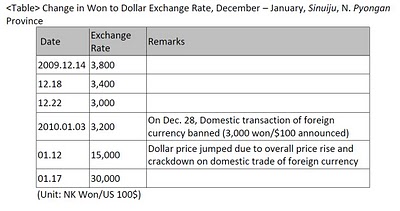According to the Chosun Ilbo:
A North Korean source has shed more light on an apology by Premier Kim Yong-il on Feb. 5 which apparently acknowledged that the currency reform in late December went disastrously wrong.
The source said Kim, not to be confused with leader Kim Jong-il, read out an hour-long statement before village chiefs and other party officials at the People’s Palace of Culture in Pyongyang on Monday morning. “I sincerely apologize for having caused great pain to the people by recklessly enforcing the latest currency reform without making sufficient preparations or considering the circumstances,” the source quoted him as saying.
Kim also pledged to rectify the mistakes, saying he would do “my best” to stabilize people’s financial circumstances. The revaluation of the won, instead of curbing inflation, led to skyrocketing prices of daily necessities.
He indicated that the regime will allow people to use foreign currency, which has been banned since the reform, and permit open-air markets to return to normal after a crackdown that seemed aimed at strangling a nascent market economy.
But Kim at the same time stressed the need to stick to state-set prices, adding that the government will strictly crack down on the hoarding of goods.
Some experts say the situation in the North has returned to almost the state before the currency reform. A South Korean official said North Korean authorities loosened their control of the markets since there has been unprecedented resistance from ordinary people. This seems to have forced Kim’s hand.
After Kim’s apology, most money changers and illegal traders who had been arrested were reportedly freed. The number of people leaving for China has grown noticeably as offices of state agencies or state-run corporations involved in earning dollars, which suspended business due to the ban on use of foreign currency, have resumed business.
The apology apparently quenched a lot of the simmering public anger.
“Premier Kim Yong-il’s direct apology to village chiefs, who are representatives of the people of each region, is tantamount to an apology to the people themselves. It’s a big event in the history of North Korea,” a former senior North Korean official who defected to the South said. “Authorities have never apologized to the people for wrong policies before.”
He believes the apology came “because discontent with the currency reform had spread widely even among core supporters of the regime,” he added.
Residents in Hwanghae Province are in some cases said to have beaten security officers who were cracking down on the use of dollars.
Since the climbdown, there have reportedly been calls to return the money the authorities confiscated. The won was revalued at a rate of 100:1, but the new won immediately plummeted in value, and those who saw their savings disappear into thin air have been demanding compensation.
The source said the apology may encourage North Koreans to become more assertive in the future.
The AP (Via Washington Post) adds:
South Korea’s National Intelligence Service and the Unification Ministry said they couldn’t confirm the Chosun Ilbo report. But Unification Ministry spokeswoman Lee Jong-joo said it would be “very rare” for a top North Korean official to issue a public apology.
Kim is believed to be the North’s No. 3 man in the country’s power hierarchy after autocratic leader Kim Jong Il and Kim Yong Nam, president of the Presidium of the Supreme People’s Assembly, according to South Korean media reports.
Last week, South Korean media reported that leader Kim Jong Il sacked a senior communist party official who spearheaded the currency reform, following arguments within the country’s elite over who should take responsibility for the fiasco.
Wow.
UPDATE: Good Friends reports that DPRK authorities are repealing market regulations. According to the AFP:
Communist North Korea has allowed private markets to reopen nationwide after a bungled currency revaluation worsened food shortages and fuelled anger at the regime, a Seoul welfare group said Thursday.
“All the markets across the country should be reopened — without exceptions — as before,” Good Friends said in a newsletter, citing what it said was a special order from the central committee of the ruling Workers’ Party.
It said security organisations across the nation were also ordered to launch “absolutely no crackdowns on trading in food” at the markets.
…
The official policy turnaround came last week, “based on assessments that the currency reform has caused enormous pain to people by paralysing distribution networks”, group director Lee Seung-Yong told AFP.
“I believe North Korea will not clamp down on market activities for a considerable period, or at least until its state distribution system is back to normal.”
The South’s unification ministry, which handles cross-border relations, could not confirm the welfare group’s report.
“We’ve heard the North gradually easing curbs on the markets but it is difficult to verify the full-scale reopening,” said spokeswoman Lee Jong-Joo.
…
Good Friends said this week that about 2,000 people had starved to death across the nation this winter.
Read the full article here:
N.Korea eases curbs on markets nationwide: group
AFP
Jun Kwanwoo
2/18/2010




